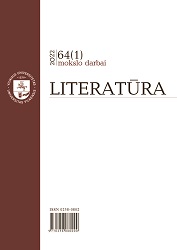Sakymo raiška Vytauto Mačernio Vizijose
Enunciative Meaning-Making in Vizijos by Vytautas Mačernis
Author(s): Paulius JevsejevasSubject(s): Poetry, Lithuanian Literature, Theory of Literature
Published by: Vilniaus Universiteto Leidykla
Keywords: Vytautas Mačernis; Vizijos; enunciation; subject; textual analysis;
Summary/Abstract: This article is a textual analysis of Vizijos (Visions), a cycle of poems by Vytautas Mačernis (1921–1944). The analysis focuses on enunciative meaning-making. The theory of enunciation (énonciation) originated in lingustics, as an inquiry into the speaking subject which, by an act of enunciation, appropriates the system of language. The introductory part of the article presents enunciative textual analysis as a modification of so-called standard greimasian textual semiotics. As a case in point, a textual analysis, by Algirdas Julien Greimas, of a poem by Marcelijus Martinaitis (“Ašara, dar tau anksti...”) is discussed, highlighting Greimas’ reluctance to discuss enunciative meaning-making. Next follows a brief discussion of an outline for inquiry into the formal apparatus of enunciation as proposed by Émile Benveniste. A model of dimensions of enunciative meaning-making that are relevant to a textual analysis of a lyric text is presented. The first part of the textual analysis is dedicated to the “Įžanga” (“Prelude”) of Visions. It is inferred that in terms of enunciative meaning-making the “Prelude” is distinct from the other parts of the work. It is argued that the “Prelude” does not live up to the standard set by those other parts. In order to demonstrate what that standard is, “Pirmoji” (“The First”) vision and excerpts of other parts are discussed. Throughout the demonstration, it is suggested that an inquiry into enunciative meaning-making leads to a different understanding of Visions than the one proposed in comprehensive studies by Virginija Balsevičiūtė-Šlekienė.
Journal: Literatūra
- Issue Year: 64/2022
- Issue No: 1
- Page Range: 23-44
- Page Count: 22
- Language: Lithuanian

